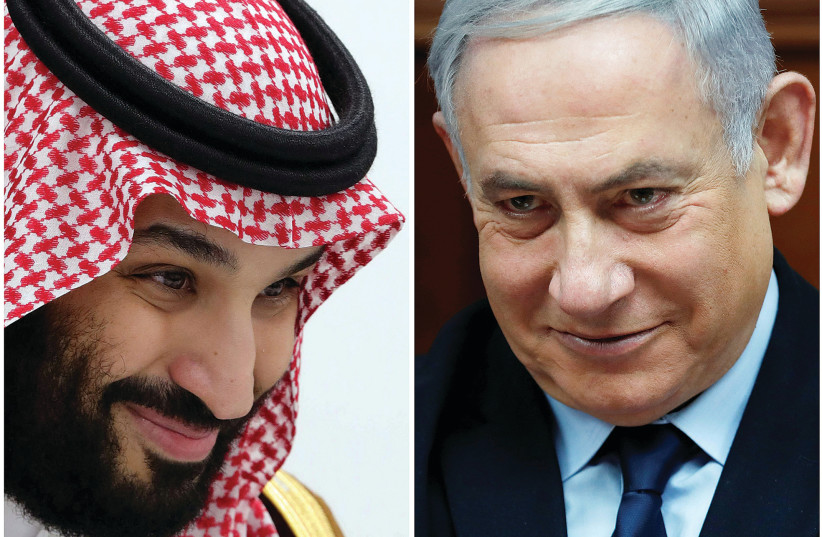Israelis are still reeling from the unprecedented, devastating October 7 terrorist atrocities committed by Hamas, on what has been called the deadliest day for the Jewish people since the Holocaust. Amid fears of a prolonged military response that might escalate into a wider conflict – with potential to destabilize the entire region – hopes for Arab-Israeli normalization appear to have collapsed.
Saudi Arabia, which was in the midst of talks with Israel about the prospects of normalization, has frozen talks entirely, and many fear the repercussions of Iran’s call for Arab nations to cooperate in confronting Israel.
Yet this is all the more reason to recall that the driving impetus behind Arab-Israeli normalization is, despite geopolitical challenges, alive and well. The reported potential financial benefits to signatory countries are astronomical.
According to a study conducted by the RAND Corp, the combined potential benefits of bilateral trade agreements to signatories come close to USD 70 billion. The change in GDP, in the case of the Arab signatories, has the potential to grow up to 0.8%. And this is only with the current four signatories. The same study predicts $1 trillion in new economic activity over a decade if the deal expands to 10 nations.
Continuing to look beyond the countries with which Israel normalized relations within the context of the Abraham Accords last year, Israel launched a series of pioneering solar, wind, and storage projects across seven Arab countries – Saudi Arabia, Bahrain, Oman, the UAE, Jordan, Morocco, and Egypt.

Furthermore, just this summer, Israeli Solar Edge formed a rare joint venture with a Saudi Arabian private firm Ajlan & Bros Holding, one of the largest private sector conglomerates in the Middle East and North Africa region, to develop renewable energy infrastructure in the Kingdom.
The impact of normalization has not only been felt internationally. The Israeli Energy Ministry announced a plan to invest $8 million to ramp up renewable energy projects in Arab municipalities inside Israel. Some have connected Israel’s efforts toward tackling inequality in Israeli society with the Accords, with Israel having a strategic interest in improving the state of Israeli Arabs.
Israel can salvage Arab normalization at COP28
HAMAS’S ATTACK has struck a blow against this quiet progress, but all is not lost. Although negotiations over normalization are frozen for now, Israel will be involved in painstaking diplomatic discussions with its Arab neighbors, including Saudi Arabia, in the UAE – the host of the pivotal UN COP28 climate summit, which gets underway at the end of this month.
The policy agenda being promoted by the UAE’s COP28 presidency is one of the most ambitious to date, and despite being hosted by one of the world’s most significant oil-producing countries, is putting the spotlight on accelerating the transition away from fossil fuels.
Aside from technical issues, the summit is expected to focus on many of the overlooked issues, such as the impact of the green transition on the global south where the infrastructure does not quite yet exist, to simply turn off fossil fuels. The summit will also be focusing on some concrete plans that the UAE has to promote the green transition, including $300 billion in projects expected to be executed this decade alongside a seven-year goal of tripling renewable energy capacity.
ON THE subject of Israeli-Arab cooperation, the summit will provide an unprecedented opportunity for Israel and the Arab world to double down on the progress made on clean energy so far. COP28 President Sultan Al Jaber’s calls to triple renewable energy capacity and decarbonize the oil industry will resonate with both Israel and Arab states which still share common concerns: They are all threatened by the disproportionately severe impacts of climate change across the Middle East; they are all oil and gas producers; and they are all seeking to diversify their energy supply and accelerate their energy transitions to the innovative technologies of the future.
With desert being over half of Israel’s terrain, the potential for solar energy is huge. While solar energy constitutes less than 10% of the country’s energy output, the Israeli government is determined to ramp up the county’s production of solar energy to 30% of Israel’s energy output by 2030, with the aim for the end of 2025 to increase Israel’s solar energy output to 20%, on the way to realizing the potential 2 billion euro gain this development can provide to the economy yearly.
Each of our countries has massive solar potential. Together, our potential is even higher. It’s in each of our interests to find a way to work together in unleashing it for our mutual benefit. At COP28, recognizing the mutual economic gains to be made from accelerating cooperation on clean energy and cleaning up fossil fuels, could spur on the kind of regional understanding that not only underpins a viable new climate deal – but helps to spur on Arab-Israeli normalization against all odds.
The writer is a political scientist specializing in Israel, defense, energy, and geopolitics of Europe and the Middle East. Her doctoral thesis was on Israel’s partnership with Azerbaijan.
